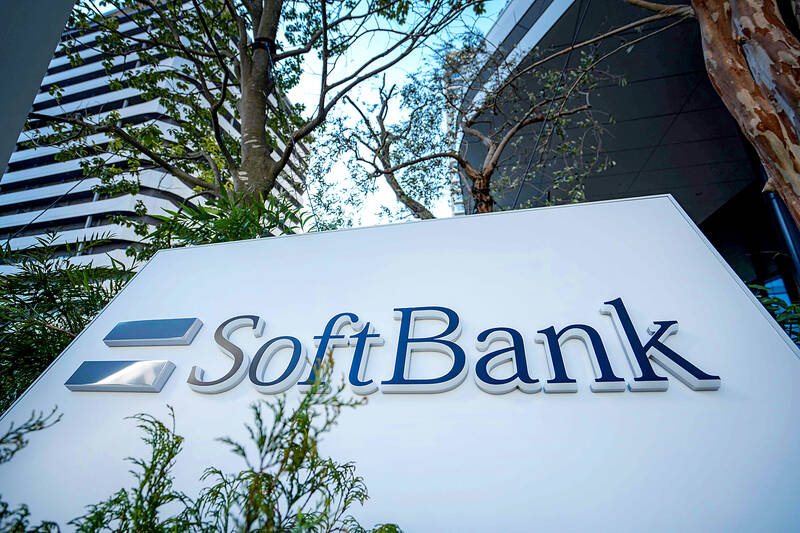Softbank Group Corp has agreed to acquire semiconductor designer Ampere Computing LLC in a move that further broadens the Japanese investment firm’s push into artificial intelligence (AI) infrastructure.
Softbank is buying Ampere in an all-cash transaction that values the Santa Clara, California-based firm at US$6.5 billion, according to a joint statement on Wednesday.
The deal for Ampere, whose early backers included Oracle Corp and private equity firm Carlyle Group Inc, adds to a wave of chip companies looking to capitalize on a spending boom in AI.

Photo: Kazuhiro Nogi, AFP
Oracle and Carlyle are selling their stakes in Ampere as part of the deal, which is expected to close in the second half of this year. Ampere will operate as a wholly owned subsidiary of Softbank, retaining both its name and Santa Clara headquarters.
Ampere, founded by former Intel Corp executive Renee James, makes processors for data center machinery including technology used by chip designer Arm Holdings PLC, which is majority-owned by Softbank.
“We are excited to join Softbank Group and partner with its portfolio of leading technology companies,” James, Ampere’s chief executive officer, said in the statement. “This is a fantastic outcome for our team, and we are excited to drive forward our AmpereOne road map for high-performance Arm processors and AI.”
In acquiring Ampere, Softbank is getting access to one of the few large design teams for the types of advanced chips used in data centers that isn’t already part of another company. It’s doing that as demand for those chips explodes amid runaway spending on AI infrastructure. Softbank also is looking for a way to increase its ability to capture some of that spending with advanced product offerings it doesn’t already have — even through Arm.
Arm is itself looking to move from being a provider of a layer of technology to a seller of more complete solutions that it can fetch a higher price. For Ampere, the migration to being part of a larger company will give it access to resources and possibly a larger set of customers that will make the economics of chip design work.
“The future of artificial super intelligence requires breakthrough computing power,” Softbank chairman and CEO Masayoshi Son said in the statement. “Ampere’s expertise in semiconductors and high-performance computing will help accelerate this vision, and deepens our commitment to AI innovation in the US.”

Nvidia Corp chief executive officer Jensen Huang (黃仁勳) on Monday introduced the company’s latest supercomputer platform, featuring six new chips made by Taiwan Semiconductor Manufacturing Co (TSMC, 台積電), saying that it is now “in full production.” “If Vera Rubin is going to be in time for this year, it must be in production by now, and so, today I can tell you that Vera Rubin is in full production,” Huang said during his keynote speech at CES in Las Vegas. The rollout of six concurrent chips for Vera Rubin — the company’s next-generation artificial intelligence (AI) computing platform — marks a strategic

REVENUE PERFORMANCE: Cloud and network products, and electronic components saw strong increases, while smart consumer electronics and computing products fell Hon Hai Precision Industry Co (鴻海精密) yesterday posted 26.51 percent quarterly growth in revenue for last quarter to NT$2.6 trillion (US$82.44 billion), the strongest on record for the period and above expectations, but the company forecast a slight revenue dip this quarter due to seasonal factors. On an annual basis, revenue last quarter grew 22.07 percent, the company said. Analysts on average estimated about NT$2.4 trillion increase. Hon Hai, which assembles servers for Nvidia Corp and iPhones for Apple Inc, is expanding its capacity in the US, adding artificial intelligence (AI) server production in Wisconsin and Texas, where it operates established campuses. This

Garment maker Makalot Industrial Co (聚陽) yesterday reported lower-than-expected fourth-quarter revenue of NT$7.93 billion (US$251.44 million), down 9.48 percent from NT$8.76 billion a year earlier. On a quarterly basis, revenue fell 10.83 percent from NT$8.89 billion, company data showed. The figure was also lower than market expectations of NT$8.05 billion, according to data compiled by Yuanta Securities Investment and Consulting Co (元大投顧), which had projected NT$8.22 billion. Makalot’s revenue this quarter would likely increase by a mid-teens percentage as the industry is entering its high season, Yuanta said. Overall, Makalot’s revenue last year totaled NT$34.43 billion, down 3.08 percent from its record NT$35.52

PRECEDENTED TIMES: In news that surely does not shock, AI and tech exports drove a banner for exports last year as Taiwan’s economic growth experienced a flood tide Taiwan’s exports delivered a blockbuster finish to last year with last month’s shipments rising at the second-highest pace on record as demand for artificial intelligence (AI) hardware and advanced computing remained strong, the Ministry of Finance said yesterday. Exports surged 43.4 percent from a year earlier to US$62.48 billion last month, extending growth to 26 consecutive months. Imports climbed 14.9 percent to US$43.04 billion, the second-highest monthly level historically, resulting in a trade surplus of US$19.43 billion — more than double that of the year before. Department of Statistics Director-General Beatrice Tsai (蔡美娜) described the performance as “surprisingly outstanding,” forecasting export growth